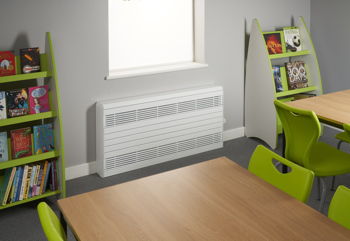In the hot seat

For any installer in the heating and ventilation industries, keeping up with the latest trends can be the difference between the business being successful or not. Quite often, these trends are based upon legislative regulations or guidance from government or industry bodies – it might be amends to Part L of the Building Regulations, initiatives such as the Renewable Heat Incentive, or health and safety updates from OFTEC.
With heating and ventilation trends changing all the time and new regulations being introduced, it’s essential for installers to keep up to date. Manufacturers can make life a little easier by offering technical support - be it online, on the phone or in person – and help to find the solutions that best reflect regulatory recommendations whilst saving the installer valuable time.
By doing so, we can influence the industry in line with legislation and regulatory compliance to make things easier for the installer.
Shift to renewables
Arguably, one of the most complicated aspects of developments in heating regulations is the shift towards renewable technologies. There is not really a simple one sentence answer to explain the benefits of life-cycle analysis and efficiency paybacks – for the installer, it is all part of an overall design concept that can lengthen any specification process. That might be less attractive than if they were to quickly commission and install simple, run-of-the-mill steelpanelled radiators, for example.
Sooner or later legislation will be introduced where renewable, sustainable technologies will be required in all builds. When that time comes, installers will need to adapt so not to get left behind – which will have its own long-term ramifications for their businesses.
Currently there seems to be a perception that installing energy efficient units is a complicated process, and it requires a higher initial financial investment. Do high costs mean high risk? No, making an educated pitch for more energy-efficient radiators will often convince the client that this is the best route forward – particularly if the installer can reference the energy savings and existing or pending regulatory requirements that will impact the client in the future.
Let’s say an installer can recommend a radiator that can save the end user up to 15% in their annual energy consumption and protect them from regulatory developments – such as low water temperatures – that could impact the building’s longterm operation. Is that not a recommendation that would set the installer in good stead for future business? A happy client is a valuable commodity.

But it is by no means a case of simply helping installers to maximise business potential. If we as manufacturers and service providers can offer as much support as possible, we can play our part in speeding up the journey towards a truly sustainable built environment.
There is no doubt that many of the legislative measures being introduced both nationally and internationally are predominantly focused on cutting energy usage and carbon emissions.
Good advice
It is a trend we cannot and should not try to ignore, so we should do everything within our power to make the transition smoother. The influence the installer has in almost every specification of a heating system should not be underestimated, so being proactive in ensuring they have all of the information to make good decisions based on legislative and environmental factors is key.
Helping installers to advise clients on how they can reduce their energy costs and ensure better standards of occupant comfort – all the while contributing to improving the health of our environment is important. Greater technical collaboration can genuinely make a difference, so let’s make it happen.
Steve Charles is technical consultant at Jaga







